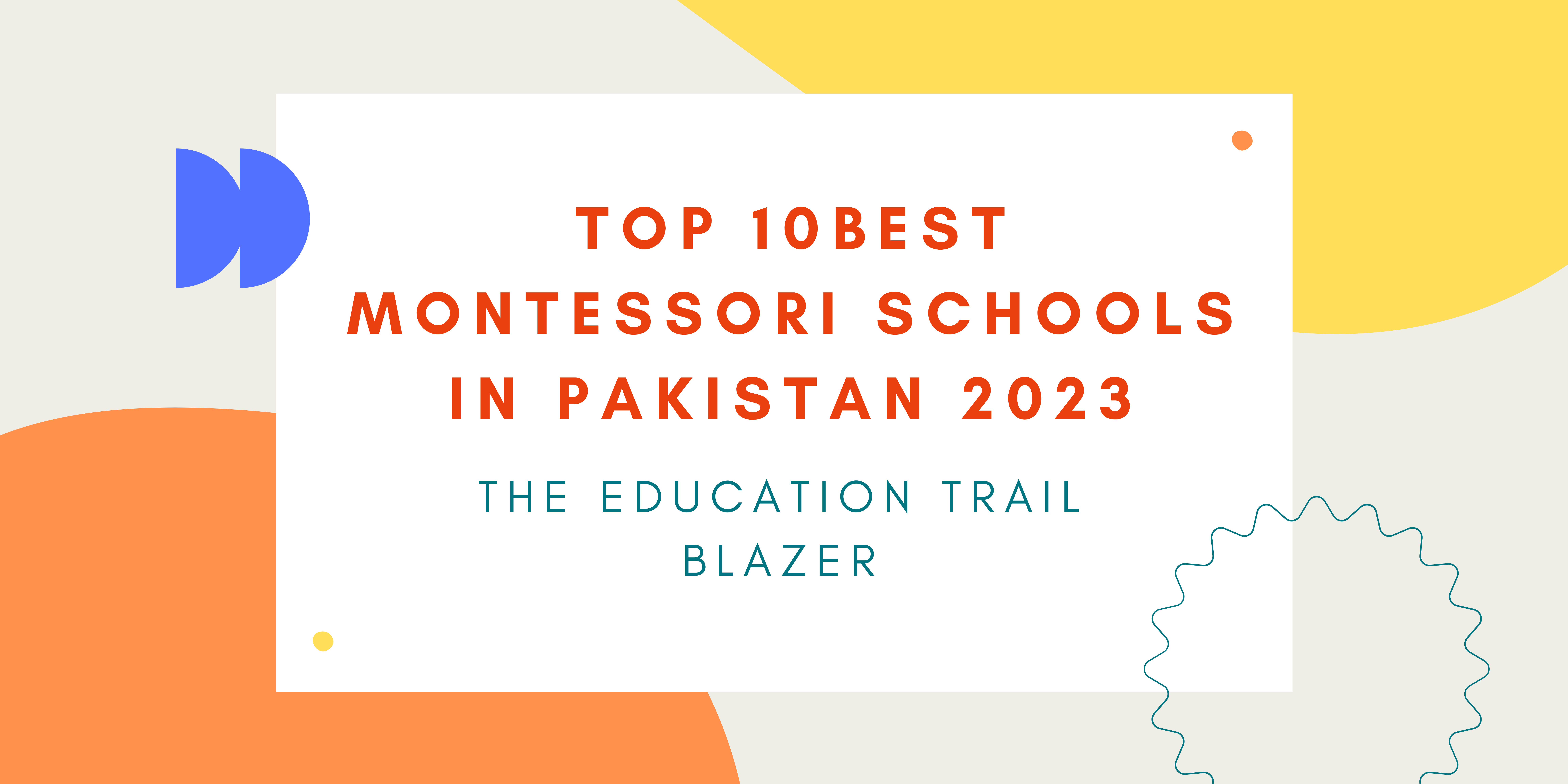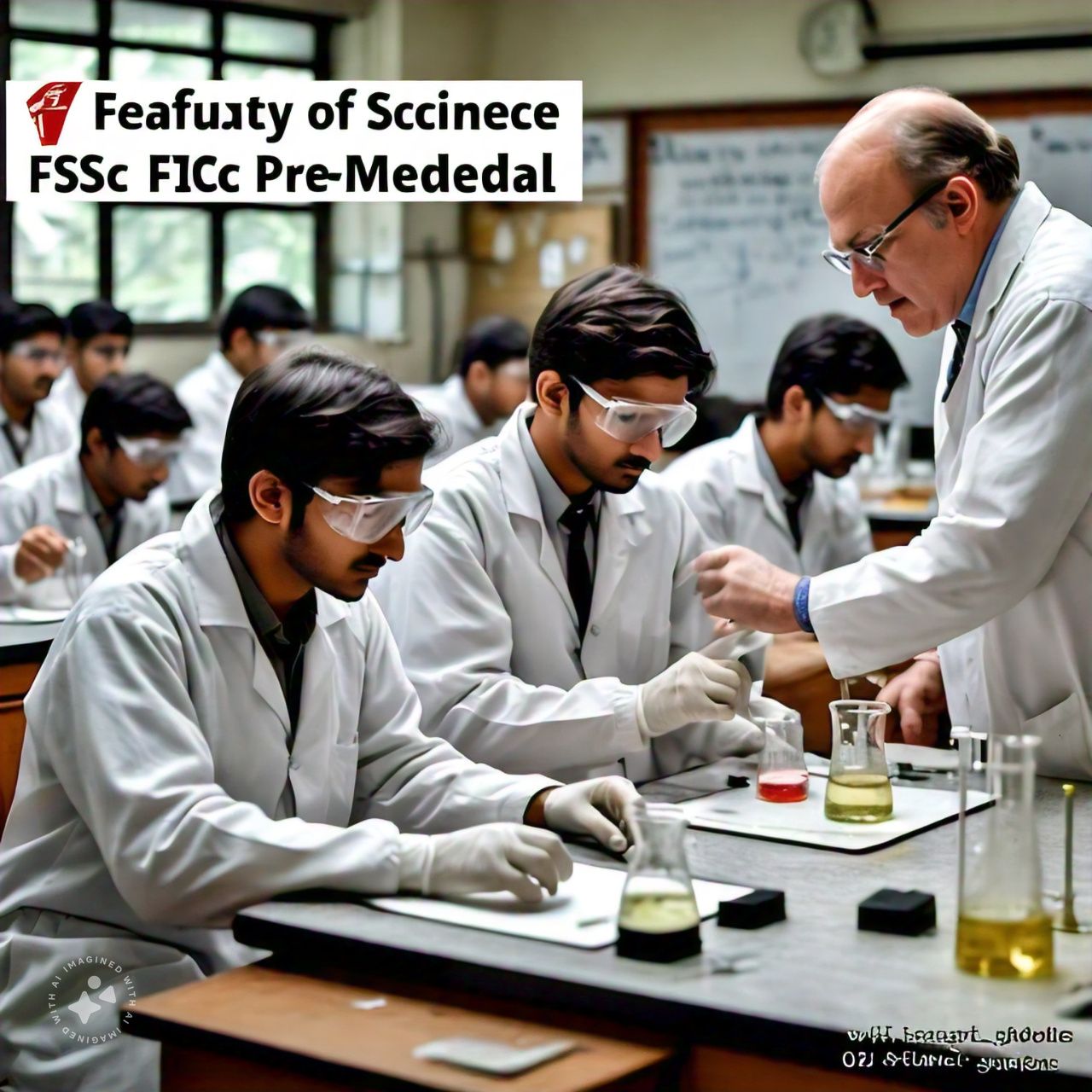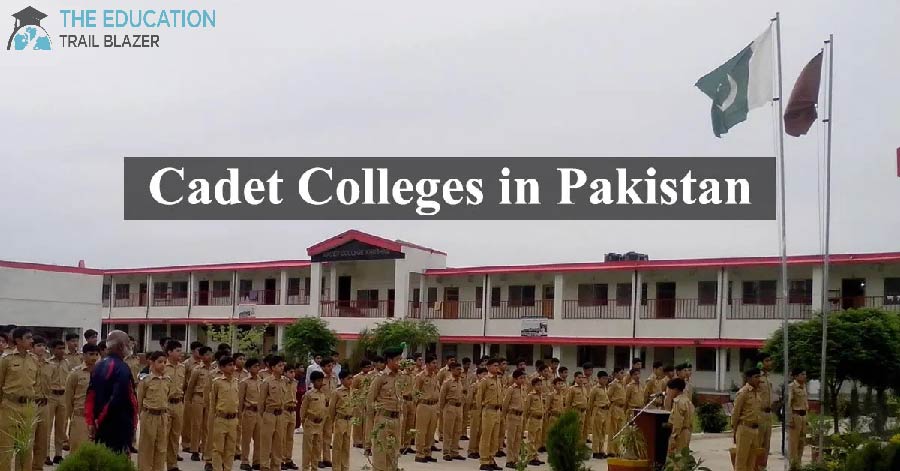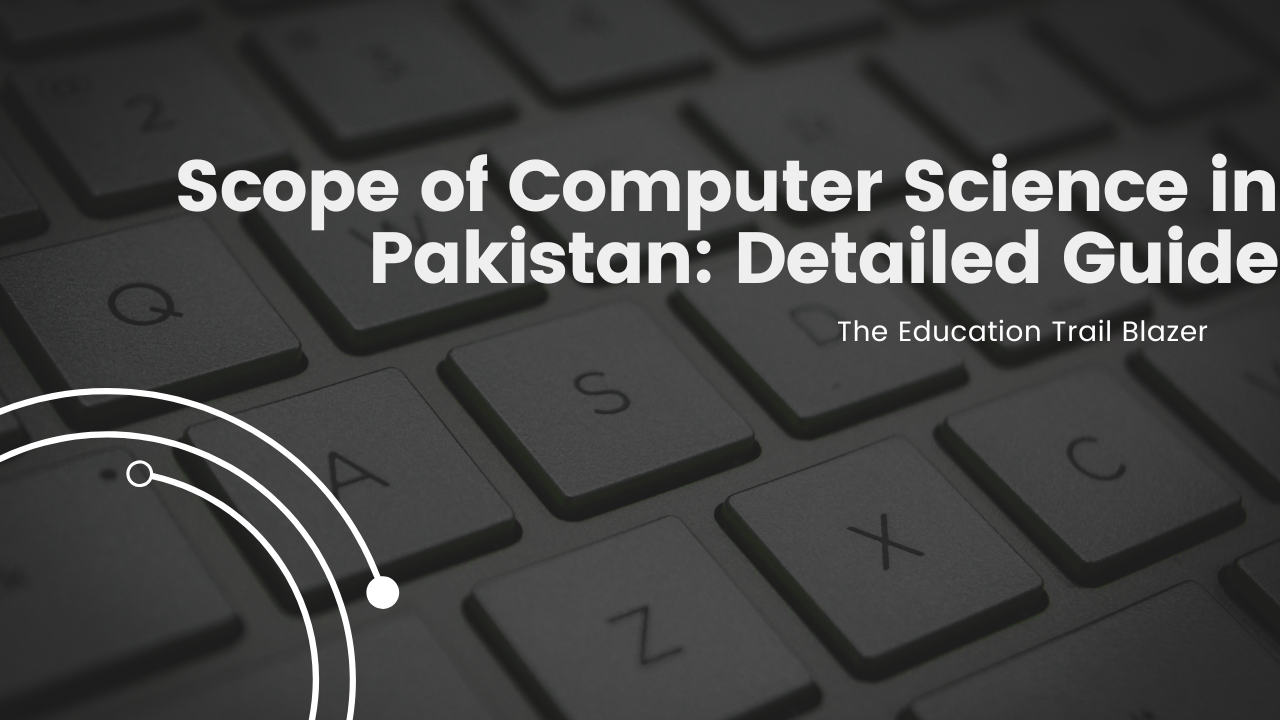Montessori education is an educational approach developed by Dr. Maria Montessori that focuses on the natural development of children through a carefully prepared environment. Montessori education has gained popularity in Pakistan over the years, with several schools adopting the Montessori method as part of their early childhood education programs. The Montessori philosophy emphasizes the importance of respecting the child’s individuality and promoting independent learning.
In Pakistan, Montessori schools typically cater to children between the ages of 2.5 and 6 years, which is considered the primary stage of Montessori education. However, some schools may extend their programs to include elementary levels as well. The curriculum in Montessori schools is designed to meet the developmental needs of children, focusing on key areas such as practical life skills, sensorial development, language, mathematics, and cultural subjects.
One of the fundamental principles of Montessori education is the prepared environment. Montessori classrooms in Pakistan are usually organized into different areas or sections, each equipped with age-appropriate materials and activities. These materials are carefully selected to encourage hands-on exploration, sensory development, and the acquisition of specific skills. For example, in the practical life area, children engage in activities such as pouring, spooning, buttoning, and sorting, which help develop fine motor skills and foster independence.
Sensorial materials play a crucial role in Montessori classrooms, allowing children to refine their senses and explore concepts such as size, shape, color, texture, and sound. The language area focuses on developing vocabulary, phonetic awareness, reading, and writing skills through various materials and activities. Similarly, the mathematics area introduces children to concepts such as number recognition, counting, sorting, and basic arithmetic operations using hands-on materials like number rods, sandpaper numbers, and counting beads.
Cultural subjects, including geography, history, science, and art, are integrated into the Montessori curriculum, offering children a broader understanding of the world around them. Montessori schools in Pakistan often incorporate cultural celebrations and events to enhance children’s cultural awareness and promote diversity.
Teachers in Montessori classrooms are trained to observe and guide children individually, taking into account their unique interests, strengths, and learning styles. They act as facilitators, providing appropriate materials and opportunities for children to explore and discover knowledge independently. The role of the teacher is to observe and support the child’s development, fostering a love for learning and a sense of responsibility.
Parents in Pakistan have shown increasing interest in Montessori education due to its child-centered approach and emphasis on holistic development. Montessori schools often conduct parent-teacher conferences and workshops to involve parents in their child’s education and provide guidance on implementing Montessori principles at home.
While Montessori education in Pakistan has gained popularity, it is important to note that not all schools labeled as “Montessori” may follow the authentic Montessori method. Some schools may use the term loosely without adhering to the core principles and practices developed by Dr. Maria Montessori. Therefore, it is essential for parents to research and visit the Montessori schools to ensure they are aligned with the authentic Montessori philosophy.
To summarize, Montessori education in Pakistan focuses on providing a child-centered learning environment where children can explore, discover, and develop at their own pace. The emphasis on independence, hands-on learning, and respect for individuality contributes to the overall growth and development of children during their early years.
Read More: Top 15 Best Private Schools in Pakistan 2023
List of Top 10 Best Montessori Schools in Pakistan
Here are a few well-known Montessori schools in Pakistan that have been recognized for their Montessori programs:
- Roots Millennium Schools
- Beaconhouse School System
- National Grammar School (NGS)
- Lahore Grammar School (LGS)
- The City School
- Karachi Grammar School
- Froebel’s International School
- Lahore Preschool
- Educators Montessori
- Bloomfield Hall School
- Head Start School
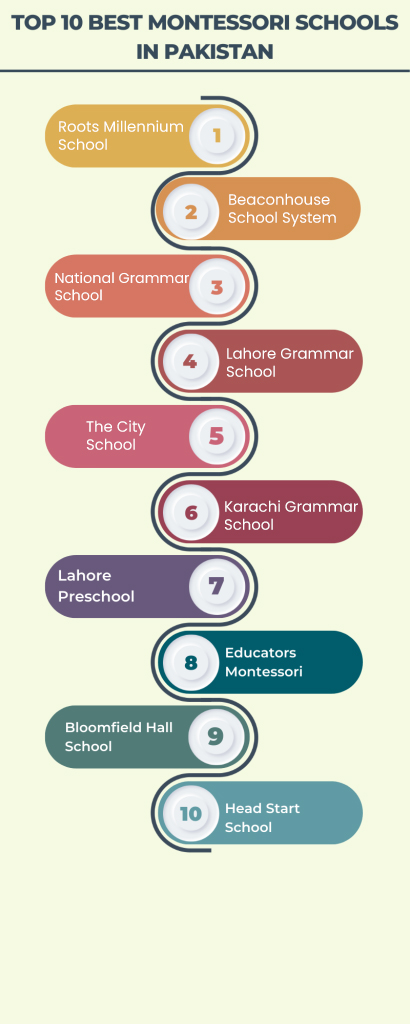
Roots Millennium Schools
Location: Multiple cities across Pakistan
Website: https://tme.edu.pk/
Roots Millennium Schools is a renowned educational institution in Pakistan and of the best montessori school in Pakistan that offers Montessori education as part of its early childhood program. Here is a detailed account of the school’s facilities, activities, and benefits related to Montessori education:
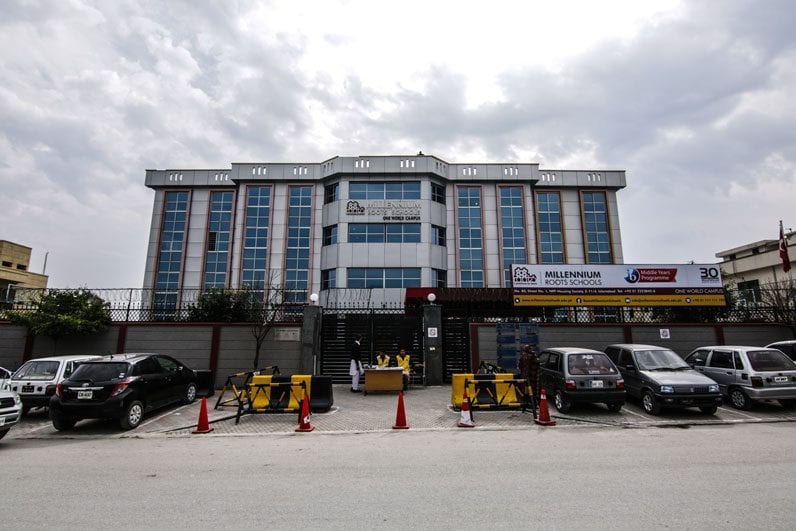
Facilities:
-
- Montessori Classrooms: Roots Millennium Schools provide dedicated Montessori classrooms that are designed to create a child-centered learning environment. These classrooms are equipped with Montessori materials and age-appropriate furniture to facilitate hands-on learning and independent exploration.
-
- Outdoor Play Areas: The schools often have outdoor play areas where Montessori children can engage in physical activities, play games, and develop their gross motor skills.
-
- Resource Centers: Roots Millennium Schools typically have resource centers or libraries that offer a range of educational materials, books, and resources to support children’s learning and provide additional opportunities for exploration and discovery.
Activities:
-
- Practical Life Skills: Roots Millennium Schools’ Montessori curriculum focuses on practical life skills such as pouring, dressing, washing, and cleaning. These activities help children develop fine motor skills, independence, and self-help abilities.
-
- Sensorial Development: The Montessori programs incorporate sensorial activities that engage children’s senses and promote their ability to discriminate, sort, categorize, and compare based on sensory attributes such as size, shape, color, and texture.
-
- Language and Literacy: Roots Millennium Schools emphasize language development through activities that enhance vocabulary, phonetic awareness, listening, speaking, reading, and writing skills. Montessori materials like sandpaper letters and movable alphabets may be utilized.
-
- Mathematics: The Montessori programs introduce mathematical concepts using hands-on materials such as number rods, counting beads, and numeral cards. Children engage in activities that develop number recognition, counting, and basic arithmetic skills.
-
- Cultural Subjects: Roots Millennium Schools’ Montessori curriculum integrates cultural subjects such as geography, history, science, and art. These subjects offer children a broader understanding of the world, promote curiosity, and encourage exploration and cultural appreciation.
Benefits:
-
- Child-Centered Approach: Roots Millennium Schools’ Montessori education follows a child-centered approach, recognizing and respecting the unique needs, interests, and learning styles of each child. This approach fosters a love for learning, intrinsic motivation, and a sense of responsibility.
-
- Holistic Development: The Montessori programs aim to foster holistic development, encompassing cognitive, social, emotional, and physical growth. The activities and materials used in the Montessori classrooms cater to various aspects of a child’s development.
-
- Self-Directed Learning: Roots Millennium Schools’ Montessori education promotes self-directed learning and independent thinking. Children are encouraged to choose their activities and work at their own pace, developing problem-solving skills, decision-making abilities, and a sense of autonomy.
-
- Prepared Environment: The Montessori classrooms provide a prepared environment that is organized, aesthetically pleasing, and conducive to learning. This environment supports concentration, focus, and the development of essential life skills.
-
- Smooth Transition to Primary Education: Roots Millennium Schools’ Montessori programs facilitate a smooth transition for children into primary education. The strong foundation in key academic areas and the development of critical skills prepare children for further learning and academic success.
Beaconhouse School System
Location: Multiple cities across Pakistan
Website: https://www.beaconhouse.net/
Beaconhouse School System is one of the largest and most reputable educational institutions in Pakistan and one of best montessori school in Pakistan, offering Montessori education as part of its early childhood program. Here is a detailed account of the school’s facilities, activities, and benefits related to Montessori education:
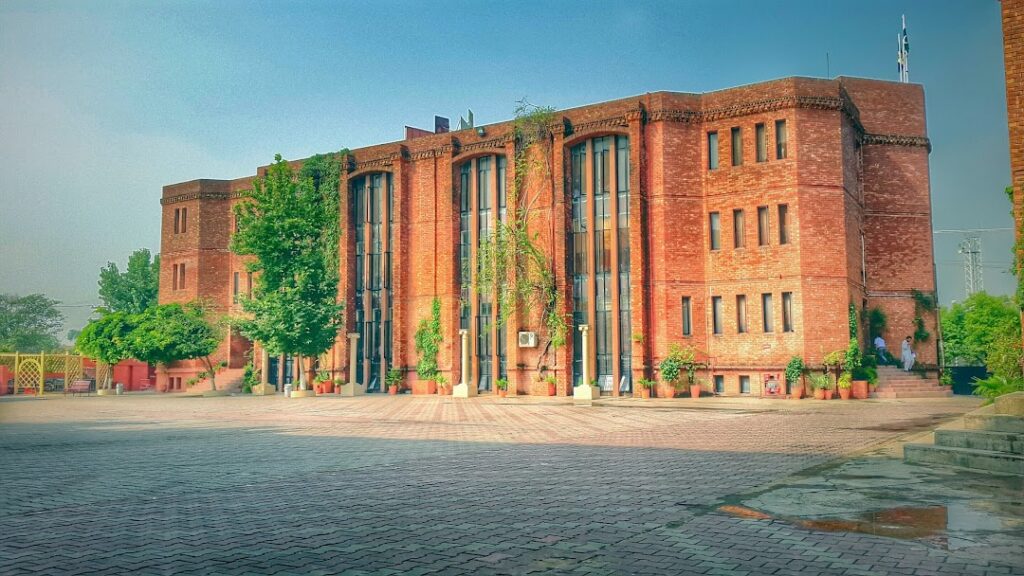
Facilities:
-
- Classroom Environment: Beaconhouse Montessori classrooms are carefully prepared environments that are designed to stimulate learning and exploration. They are equipped with age-appropriate Montessori materials and furniture to facilitate hands-on experiences and independent learning.
-
- Outdoor Play Areas: Beaconhouse Montessori schools often provide dedicated outdoor play areas where children can engage in physical activities, develop gross motor skills, and interact with nature.
-
- Library and Resource Centers: The schools typically have well-stocked libraries and resource centers where children can explore books, puzzles, and educational materials.
Activities:
-
- Practical Life Skills: Beaconhouse Montessori schools focus on developing practical life skills in children, such as pouring, buttoning, sweeping, and setting the table. These activities promote independence, fine motor skills, and the development of self-help skills.
-
- Sensorial Development: The schools offer sensorial activities that help children refine their senses and develop skills such as discrimination, sorting, and matching based on attributes like size, shape, color, and texture.
-
- Language and Literacy: Beaconhouse Montessori schools provide language-rich environments where children engage in activities that promote vocabulary development, phonetic awareness, reading, and writing skills. They may use Montessori materials like sandpaper letters and moveable alphabets.
-
- Mathematics: Beaconhouse Montessori schools introduce mathematical concepts through hands-on materials like number rods, counting beads, and numeral cards. Children engage in activities that promote number recognition, counting, and basic arithmetic operations.
-
- Cultural Subjects: Beaconhouse Montessori schools integrate cultural subjects like geography, history, science, and art into their curriculum. This helps children develop a broader understanding of the world and encourages curiosity and exploration.
Benefits:
-
- Child-Centered Approach: Beaconhouse Montessori education follows a child-centered approach, focusing on the individual needs, interests, and abilities of each child. This approach allows children to learn at their own pace and promotes a love for learning.
-
- Independence and Self-Discipline: The Montessori method emphasizes the development of independence and self-discipline in children. Beaconhouse Montessori schools provide an environment that allows children to make choices, take responsibility for their learning, and develop self-control.
-
- Holistic Development: Beaconhouse Montessori education aims to foster the holistic development of children, including their cognitive, social, emotional, and physical growth. The activities and materials used in the Montessori classrooms cater to various aspects of a child’s development.
-
- Prepared Environment: Beaconhouse Montessori classrooms are carefully prepared environments that promote order, cleanliness, and a sense of structure. This provides a calm and focused atmosphere that enhances learning and concentration.
National Grammar School (NGS)
Location: Multiple cities across Pakistan
Website: www.ngspreschool.com
NGS PRESCHOOL offers a holistic educational experience to each child by inspiring a lifelong love for learning and by inculcating skills that enable them to become independent thinkers, effective communicators and solution seekers. Their curriculum is comprehensively designed by their Educational Experts and it incorporates the Habits of Mind framework, Multiple Intelligences Theory, Montessori Approach, Positive Psychology and their unique and trademarked curriculum (NGS PRESCHOOL FIVE STAR CURRICULUM).
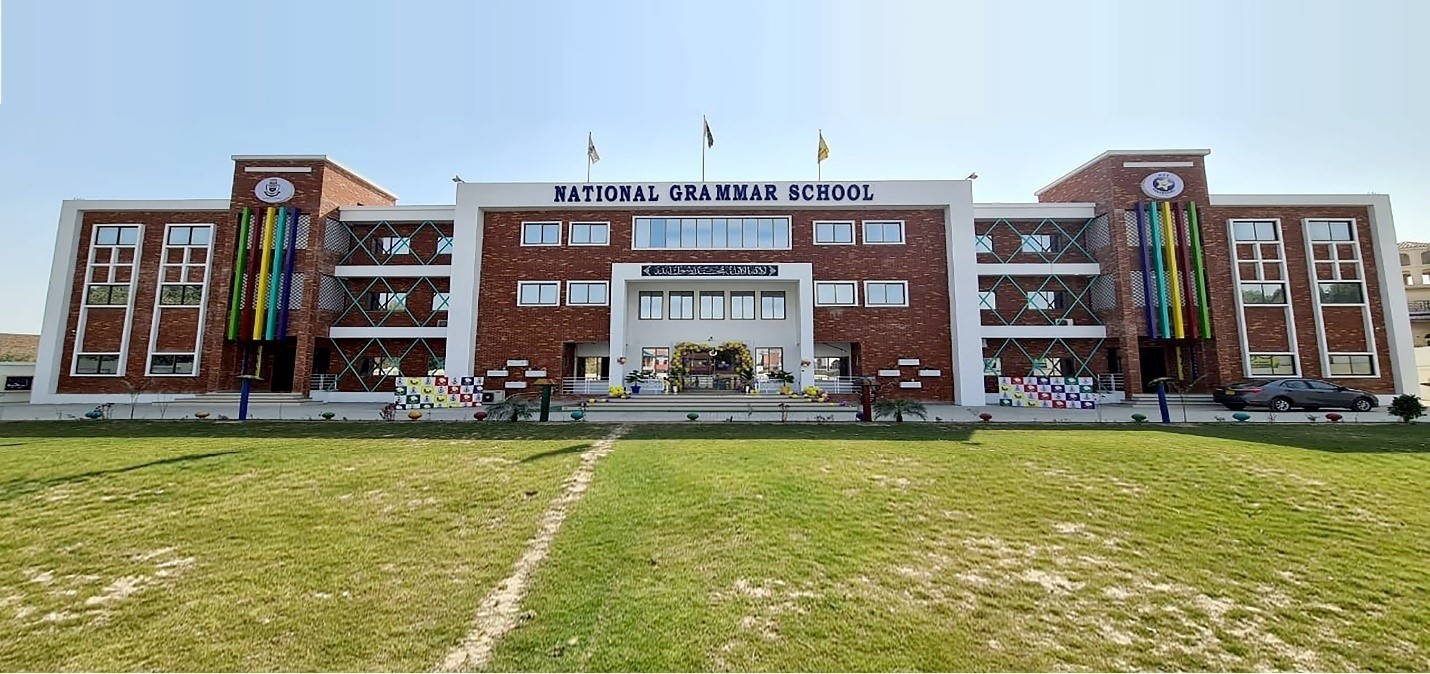
Facilities:
Classroom Environment: NGS PRESCHOOL classrooms are thoughtfully designed to nurture curiosity and independence. The environment is meticulously prepared to include age-appropriate Montessori materials and furniture that support hands-on learning and exploration. Each classroom is organized to encourage self-directed activities, fostering a sense of responsibility and autonomy in students.
Outdoor Play Areas: The outdoor play areas at NGS PRESCHOOL are vibrant spaces where children can develop gross motor skills, engage in physical activities, and connect with nature. These areas are designed to provide a safe and stimulating environment for outdoor play, promoting physical health and social interaction.
Library and Resource Centre: Each NGS PRESCHOOL features well-stocked libraries and resource centre, offering a rich selection of books, puzzles, and educational materials. These centres are designed to spark a love for reading and support cognitive development, providing children with the resources they need to explore their interests and expand their knowledge.
Activities:
Practical Life Skills: At NGS PRESCHOOL, practical life activities are integral to the curriculum. Children engage in tasks such as pouring, buttoning, sweeping, and setting the table, which help develop fine motor skills, independence, and self-care abilities. These activities are designed to build confidence and a sense of accomplishment in everyday tasks.
Sensorial Development: Sensory activities are a key component of the Montessori approach at NGS PRESCHOOL. Children participate in exercises that refine their senses and enhance their ability to discriminate, sort, and match different attributes like size, shape, colour, and texture. These activities support cognitive development and perceptual skills.
Language and Literacy: NGS PRESCHOOL create a language-rich environment where children actively engage in vocabulary development, phonetic awareness, reading, and writing. Montessori materials such as sandpaper letters and moveable alphabets are used to reinforce language skills and promote literacy in a hands-on manner.
Mathematics: Mathematical concepts are introduced through engaging, tactile materials at NGS PRESCHOOL. Children work with number rods, counting beads, and numeral cards to explore number recognition, counting, and basic arithmetic operations. This approach fosters a deep understanding of mathematical principles through direct, experiential learning.
Cultural Subjects: The Montessori curriculum at NGS PRESCHOOL incorporates cultural subjects including geography, history, science, and art. This integration helps children develop a broader understanding of the world, encouraging curiosity and a lifelong love for learning about diverse cultures and disciplines.
Benefits:
Child-Centred Approach: NGS PRESCHOOL education prioritizes the individual needs, interests, and abilities of each child. This child-centred approach allows students to learn at their own pace, fostering a genuine love for learning and a sense of ownership over their educational journey.
Independence and Self-Discipline: The Montessori Method emphasizes the development of independence and self-discipline. NGS PRESCHOOL provides an environment where children are encouraged to make choices, take responsibility for their learning, and cultivate self-control and personal growth.
Holistic Development: The holistic approach of NGS PRESCHOOL education supports the social, emotional, and physical development of each child. Activities and materials in the Montessori classrooms are designed to cater to various aspects of a child’s development, ensuring a well-rounded educational experience.
Prepared Environment: The carefully prepared environment of NGS PRESCHOOL classrooms promotes order, cleanliness, and a structured atmosphere. This organization creates a calm and focused learning environment, enhancing concentration and facilitating effective learning experiences.
NGS PRESCHOOL offers a nurturing and stimulating environment designed to foster growth, independence, and a lifelong passion for learning in every child.
Lahore Grammar School (LGS)
Location: Multiple cities across Pakistan
Website: https://lgs.edu.pk/
Lahore Grammar School (LGS) is a renowned educational institution in Pakistan that offers Montessori education as part of its early childhood program. Here is a detailed account of the school’s facilities, activities, and benefits related to Montessori education:
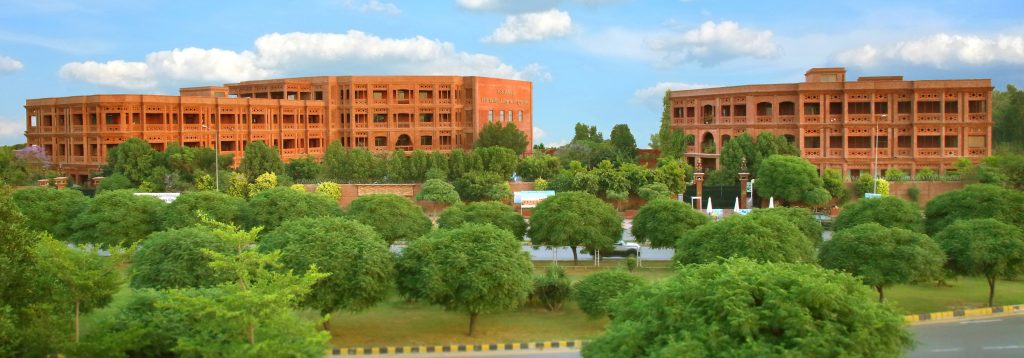
Facilities:
-
- Montessori Classrooms: LGS provides well-equipped Montessori classrooms that are specifically designed to create a child-friendly environment. These classrooms are equipped with Montessori materials and age-appropriate furniture to facilitate hands-on learning and independent exploration.
-
- Outdoor Play Areas: LGS Montessori schools often have dedicated outdoor play areas where children can engage in physical activities, play games, and develop gross motor skills.
-
- Library and Resource Centers: LGS Montessori schools typically have libraries and resource centers that provide a wide range of age-appropriate books, educational resources, and learning materials to support children’s learning and curiosity.
Activities:
-
- Practical Life Skills: LGS Montessori programs focus on developing practical life skills in children, such as pouring, dressing, cleaning, and caring for their environment. These activities enhance fine motor skills, independence, and promote self-help skills.
-
- Sensorial Development: LGS Montessori schools provide sensorial activities that help children refine their senses and develop skills like discrimination, sorting, grading, and matching based on different sensory attributes.
-
- Language and Literacy: LGS Montessori schools emphasize language and literacy development through activities that promote vocabulary building, phonetic awareness, reading, and writing skills. Montessori materials like sandpaper letters and moveable alphabets may be used.
-
- Mathematics: LGS Montessori programs introduce mathematical concepts using hands-on materials like number rods, counting beads, and numeral cards. Children engage in activities that promote number recognition, counting, and basic arithmetic operations.
-
- Cultural Subjects: LGS Montessori schools integrate cultural subjects such as geography, history, science, and art into their curriculum. This helps children develop a broader understanding of the world and encourages exploration and curiosity.
Benefits:
-
- Child-Centered Approach: LGS Montessori education follows a child-centered approach, recognizing and catering to the unique needs, interests, and abilities of each child. This approach fosters a love for learning, self-motivation, and independent thinking.
-
- Holistic Development: LGS Montessori programs aim to foster the holistic development of children, including their cognitive, social, emotional, and physical growth. The activities and materials used in the Montessori classrooms promote well-rounded development.
-
- Individualized Learning: LGS Montessori education allows for individualized learning experiences. The Montessori method encourages children to work at their own pace and follow their interests, promoting a sense of ownership and self-directed learning.
-
- Prepared Environment: LGS Montessori classrooms provide a prepared environment that is organized, orderly, and aesthetically pleasing. This environment supports concentration, focus, and the development of essential life skills.
-
- Smooth Transition to Primary Education: LGS Montessori programs often provide a smooth transition for children into primary education, as they develop a strong foundation in key academic areas and essential skills.
The City School
Location: Multiple cities across Pakistan
Website: https://thecityschool.edu.pk/
The City School is a well-established educational institution in Pakistan that offers Montessori education as part of its early childhood program. Here is a detailed account of the school’s facilities, activities, and benefits related to Montessori education:

Facilities:
-
- Montessori Classrooms: The City School provides dedicated Montessori classrooms that are thoughtfully designed and equipped with Montessori materials and age-appropriate furniture. These classrooms create a child-centered environment that promotes exploration, independence, and active learning.
-
- Outdoor Play Areas: The City School’s Montessori programs often have outdoor play areas where children can engage in physical activities, play games, and develop their gross motor skills.
-
- Resource Centers: The schools typically have resource centers or libraries that offer a range of educational materials, books, and resources to support children’s learning and provide additional opportunities for exploration and discovery.
Activities:
-
- Practical Life Skills: The City School’s Montessori curriculum focuses on practical life skills such as pouring, dressing, washing, and cleaning. These activities help children develop fine motor skills, independence, and self-help abilities.
-
- Sensorial Development: The Montessori programs at The City School incorporate sensorial activities that engage children’s senses and promote their ability to discriminate, sort, classify, and compare based on sensory attributes like size, shape, color, and texture.
-
- Language and Literacy: The City School’s Montessori education emphasizes language development through activities that enhance vocabulary, phonetic awareness, listening, speaking, reading, and writing skills. Montessori materials such as sandpaper letters and movable alphabets may be utilized.
-
- Mathematics: The City School’s Montessori programs introduce mathematical concepts through hands-on materials like number rods, counting beads, and numeral cards. Children engage in activities that develop number recognition, counting, and basic arithmetic skills.
-
- Cultural Subjects: The Montessori curriculum at The City School integrates cultural subjects such as geography, history, science, and art. These subjects offer children a broader understanding of the world and encourage curiosity, exploration, and cultural appreciation.
Benefits:
-
- Child-Centered Approach: The City School’s Montessori education follows a child-centered approach, recognizing and respecting the individuality, interests, and learning styles of each child. This approach fosters a love for learning, intrinsic motivation, and a sense of responsibility.
-
- Holistic Development: The Montessori programs at The City School aim to promote holistic development, encompassing cognitive, social, emotional, and physical growth. The activities and materials used in the Montessori classrooms cater to various aspects of a child’s development.
-
- Self-Directed Learning: The City School’s Montessori education promotes self-directed learning and independent thinking. By allowing children to choose their activities and work at their own pace, they develop problem-solving skills, decision-making abilities, and a sense of autonomy.
-
- Prepared Environment: The City School’s Montessori classrooms provide a prepared environment that is organized, orderly, and aesthetically pleasing. This environment supports concentration, focus, and the development of essential life skills.
-
- Smooth Transition to Primary Education: The Montessori programs at The City School often facilitate a smooth transition for children into primary education. The strong foundation in key academic areas and the development of critical skills prepare children for further learning and academic success.
Karachi Grammar School
Location: Karachi
Website: https://www.kgs.edu.pk/
Karachi Grammar School (KGS) is a prestigious educational institution in Pakistan that offers Montessori education as part of its early childhood program. Here is a detailed account of the school’s facilities, activities, and benefits related to Montessori education:
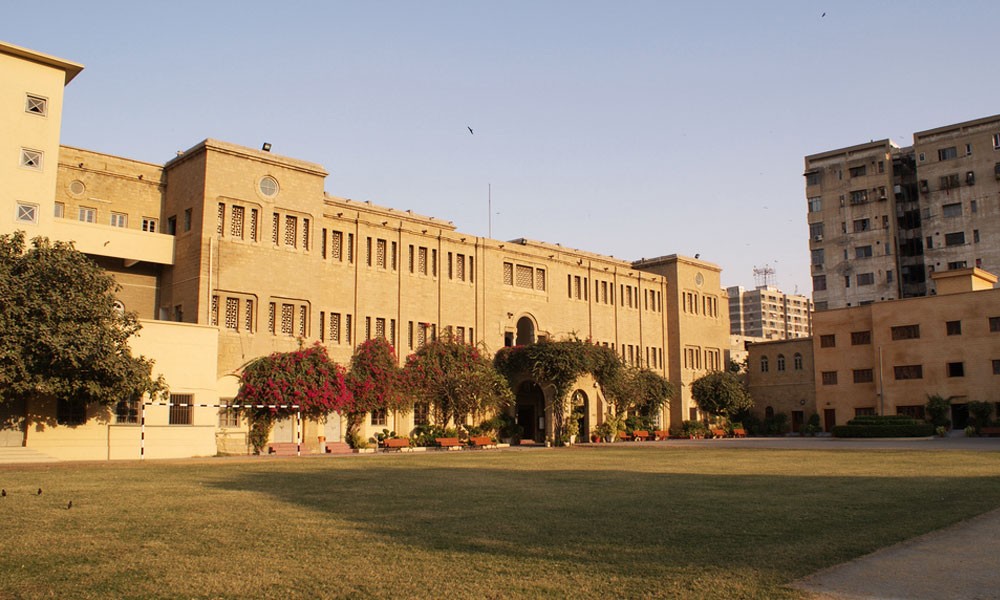
Facilities:
-
- Montessori Classrooms: Karachi Grammar School provides well-equipped Montessori classrooms designed to create a child-friendly and engaging learning environment. These classrooms are furnished with Montessori materials and age-appropriate furniture to facilitate hands-on learning and independent exploration.
-
- Outdoor Play Areas: KGS Montessori programs often have dedicated outdoor play areas where children can engage in physical activities, play games, and develop their gross motor skills.
-
- Library and Resource Centers: The school typically has libraries and resource centers that offer a wide range of age-appropriate books, educational resources, and learning materials to support children’s learning and promote literacy.
Activities:
-
- Practical Life Skills: KGS Montessori curriculum focuses on practical life skills, including activities such as pouring, dressing, washing, and cleaning. These activities help children develop fine motor skills, independence, and self-help abilities.
-
- Sensorial Development: KGS Montessori programs provide sensorial activities that engage children’s senses and promote their ability to discriminate, sort, categorize, and compare based on sensory attributes like size, shape, color, and texture.
-
- Language and Literacy: KGS Montessori education emphasizes language development through activities that enhance vocabulary, phonetic awareness, listening, speaking, reading, and writing skills. Montessori materials such as sandpaper letters and movable alphabets may be used.
-
- Mathematics: KGS Montessori programs introduce mathematical concepts through hands-on materials like number rods, counting beads, and numeral cards. Children engage in activities that develop number recognition, counting, and basic arithmetic skills.
-
- Cultural Subjects: KGS Montessori curriculum integrates cultural subjects such as geography, history, science, and art. These subjects offer children a broader understanding of the world, promote curiosity, and encourage exploration and cultural appreciation.
Benefits:
-
- Child-Centered Approach: KGS Montessori education follows a child-centered approach, recognizing and respecting the unique needs, interests, and learning styles of each child. This approach fosters a love for learning, intrinsic motivation, and a sense of responsibility.
-
- Holistic Development: KGS Montessori programs aim to promote holistic development, encompassing cognitive, social, emotional, and physical growth. The activities and materials used in the Montessori classrooms cater to various aspects of a child’s development.
-
- Self-Directed Learning: KGS Montessori education promotes self-directed learning and independent thinking. Children are encouraged to choose their activities and work at their own pace, developing problem-solving skills, decision-making abilities, and a sense of autonomy.
-
- Prepared Environment: KGS Montessori classrooms provide a prepared environment that is organized, aesthetically pleasing, and conducive to learning. This environment supports concentration, focus, and the development of essential life skills.
-
- Smooth Transition to Primary Education: KGS Montessori programs facilitate a smooth transition for children into primary education. The strong foundation in key academic areas and the development of critical skills prepare children for further learning and academic success.
Froebel’s International School
Location: Islamabad
Website: https://froebels-isb.edu.pk/
Froebel’s International School is a renowned educational institution in Pakistan that offers Montessori education as part of its early childhood program. Here is a detailed account of the school’s facilities, activities, and benefits related to Montessori education:
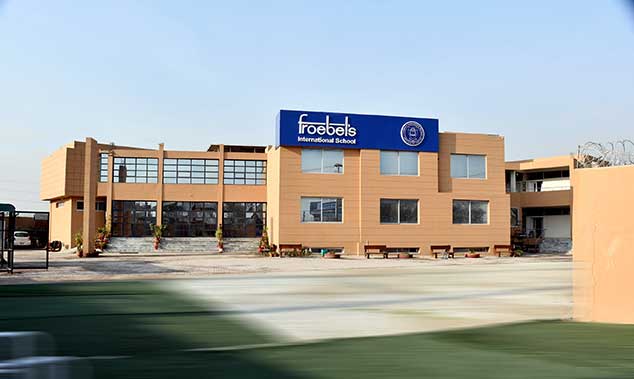
Facilities:
-
- Montessori Classrooms: Froebel’s International School provides dedicated Montessori classrooms that are specially designed to create a nurturing and stimulating learning environment. These classrooms are equipped with Montessori materials and age-appropriate furniture, fostering hands-on learning and independent exploration.
-
- Outdoor Play Areas: The school often has outdoor play areas where Montessori children can engage in physical activities, play games, and develop their gross motor skills.
-
- Learning Resources: Froebel’s International School typically has learning resource centers or libraries that offer a wide range of educational materials, books, and resources to support children’s learning and facilitate exploration.
Activities:
-
- Practical Life Skills: Froebel’s Montessori curriculum emphasizes practical life skills, including activities such as pouring, dressing, cleaning, and caring for the environment. These activities promote fine motor skills, independence, and self-help abilities.
-
- Sensorial Development: The school incorporates sensorial activities that engage children’s senses and help them refine their ability to discriminate, sort, categorize, and compare based on different sensory attributes such as size, shape, color, and texture.
-
- Language and Literacy: Froebel’s Montessori education focuses on language development through activities that enhance vocabulary, phonetic awareness, listening, speaking, reading, and writing skills. Montessori materials like sandpaper letters and movable alphabets may be utilized.
-
- Mathematics: Froebel’s Montessori programs introduce mathematical concepts through hands-on materials such as number rods, counting beads, and numeral cards. Children engage in activities that promote number recognition, counting, and basic arithmetic skills.
-
- Cultural Subjects: Froebel’s Montessori curriculum integrates cultural subjects such as geography, history, science, and art. These subjects provide children with a broader understanding of the world, foster curiosity, and encourage exploration and cultural appreciation.
Benefits:
-
- Child-Centered Approach: Froebel’s Montessori education follows a child-centered approach that recognizes and respects the unique needs, interests, and learning styles of each child. This approach promotes a love for learning, intrinsic motivation, and a sense of responsibility.
-
- Holistic Development: Froebel’s Montessori programs aim to foster holistic development, encompassing cognitive, social, emotional, and physical growth. The activities and materials used in the Montessori classrooms cater to various aspects of a child’s development.
-
- Self-Directed Learning: Froebel’s Montessori education encourages self-directed learning and independent thinking. Children have the freedom to choose their activities and work at their own pace, developing problem-solving skills, decision-making abilities, and a sense of autonomy.
-
- Prepared Environment: Froebel’s Montessori classrooms provide a prepared environment that is organized, orderly, and aesthetically pleasing. This environment supports concentration, focus, and the development of essential life skills.
-
- Smooth Transition to Primary Education: Froebel’s Montessori programs facilitate a smooth transition for children into primary education. The strong foundation in key academic areas and the development of critical skills prepare children for further learning and academic success.
Lahore Preschool
Location: Lahore
Website: https://www.lahorepreschool.edu.pk/
Lahore Preschool is a reputable Montessori School in Lahore, Pakistan, that offers Montessori education as part of its early childhood program. Here is a detailed account of the school’s facilities, activities, and benefits related to Montessori education:
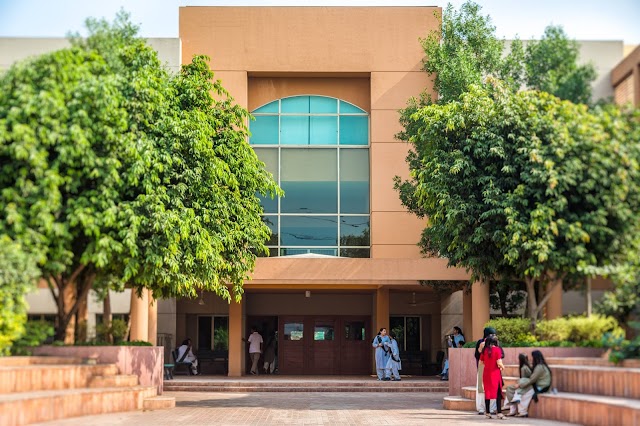
Facilities:
-
- Montessori Classrooms: Lahore Preschool provides dedicated Montessori classrooms that are carefully designed to create a conducive learning environment. These classrooms are equipped with Montessori materials and child-sized furniture, allowing for independent exploration and hands-on learning.
-
- Outdoor Play Areas: The school often has spacious outdoor play areas where Montessori children can engage in physical activities, play games, and develop their gross motor skills.
-
- Learning Resources: Lahore Preschool typically has well-stocked libraries and resource centers that offer a variety of educational materials, books, and resources to support children’s learning and encourage further exploration.
Activities:
-
- Practical Life Skills: Lahore Preschool’s Montessori curriculum emphasizes practical life skills, such as pouring, dressing, cleaning, and food preparation. These activities help children develop fine motor skills, independence, and self-help abilities.
-
- Sensorial Development: The school incorporates sensorial activities that engage children’s senses and help them refine their ability to observe, discriminate, compare, and categorize based on various sensory attributes like size, shape, color, and texture.
-
- Language and Literacy: Lahore Preschool focuses on language development through activities that enhance vocabulary, phonetic awareness, listening, speaking, reading, and writing skills. Montessori materials, including sandpaper letters and movable alphabets, may be utilized.
-
- Mathematics: The Montessori programs introduce mathematical concepts using hands-on materials like number rods, counting beads, and numeral cards. Children engage in activities that develop number recognition, counting, and basic arithmetic skills.
-
- Cultural Subjects: Lahore Preschool’s Montessori curriculum integrates cultural subjects such as geography, history, science, and art. These subjects provide children with a broader understanding of the world, promote curiosity, and encourage exploration and cultural appreciation.
Benefits:
-
- Child-Centered Approach: Lahore Preschool’s Montessori education follows a child-centered approach, recognizing and respecting the unique needs, interests, and learning styles of each child. This approach fosters a love for learning, intrinsic motivation, and a sense of responsibility.
-
- Holistic Development: The Montessori programs at Lahore Preschool aim to promote holistic development, encompassing cognitive, social, emotional, and physical growth. The activities and materials used in the Montessori classrooms cater to various aspects of a child’s development.
-
- Self-Directed Learning: Lahore Preschool’s Montessori education encourages self-directed learning and independent thinking. Children are given the freedom to choose their activities and work at their own pace, developing problem-solving skills, decision-making abilities, and a sense of autonomy.
-
- Prepared Environment: Lahore Preschool’s Montessori classrooms provide a prepared environment that is organized, visually appealing, and supportive of learning. This environment facilitates concentration, focus, and the development of essential life skills.
-
- Smooth Transition to Primary Education: Lahore Preschool’s Montessori programs facilitate a smooth transition for children into primary education. The strong foundation in key academic areas and the development of critical skills prepare children for further learning and academic success.
Educators Montessori
Location: Multiple cities across Pakistan
Website: https://www.educators.edu.pk/
Educators Montessori is a renowned educational institution in Pakistan and one of the top montessori schools in Pakistan that offers Montessori education as part of its early childhood program. Here is a detailed account of the school’s facilities, activities, and benefits related to Montessori education:

Facilities:
-
- Montessori Classrooms: Educators Montessori provides dedicated Montessori classrooms that are specifically designed to create an engaging and child-centered learning environment. These classrooms are equipped with Montessori materials and age-appropriate furniture, promoting hands-on learning and independent exploration.
-
- Outdoor Play Areas: The school typically has outdoor play areas where Montessori children can engage in physical activities, play games, and develop their gross motor skills.
-
- Learning Resources: Educators Montessori schools often have well-stocked libraries and resource centers that offer a wide range of educational materials, books, and resources to support children’s learning and encourage further exploration.
Activities:
-
- Practical Life Skills: Educators Montessori curriculum emphasizes practical life skills, including activities such as pouring, dressing, cleaning, and food preparation. These activities help children develop fine motor skills, independence, and self-help abilities.
-
- Sensorial Development: The school incorporates sensorial activities that engage children’s senses and assist in refining their ability to observe, discriminate, compare, and categorize based on various sensory attributes like size, shape, color, and texture.
-
- Language and Literacy: Educators Montessori programs focus on language development through activities that enhance vocabulary, phonetic awareness, listening, speaking, reading, and writing skills. Montessori materials like sandpaper letters and movable alphabets may be utilized.
-
- Mathematics: The Montessori programs introduce mathematical concepts using hands-on materials such as number rods, counting beads, and numeral cards. Children engage in activities that develop number recognition, counting, and basic arithmetic skills.
-
- Cultural Subjects: Educators Montessori curriculum integrates cultural subjects such as geography, history, science, and art. These subjects provide children with a broader understanding of the world, promote curiosity, and encourage exploration and cultural appreciation.
Benefits:
-
- Child-Centered Approach: Educators Montessori education follows a child-centered approach, recognizing and respecting the unique needs, interests, and learning styles of each child. This approach fosters a love for learning, intrinsic motivation, and a sense of responsibility.
-
- Holistic Development: The Montessori programs at Educators Montessori aim to promote holistic development, encompassing cognitive, social, emotional, and physical growth. The activities and materials used in the Montessori classrooms cater to various aspects of a child’s development.
-
- Self-Directed Learning: Educators Montessori education encourages self-directed learning and independent thinking. Children are given the freedom to choose their activities and work at their own pace, developing problem-solving skills, decision-making abilities, and a sense of autonomy.
-
- Prepared Environment: Educators Montessori classrooms provide a prepared environment that is organized, visually appealing, and conducive to learning. This environment supports concentration, focus, and the development of essential life skills.
-
- Smooth Transition to Primary Education: Educators Montessori programs facilitate a smooth transition for children into primary education. The strong foundation in key academic areas and the development of critical skills prepare children for further learning and academic success.
Bloomfield Hall School
Location: Multiple cities across Pakistan
Website: https://bhs.edu.pk/
Bloomfield Hall School is a well-established educational institution in Pakistan that offers Montessori education as part of its early childhood program. Here is a detailed account of the school’s facilities, activities, and benefits related to Montessori education:
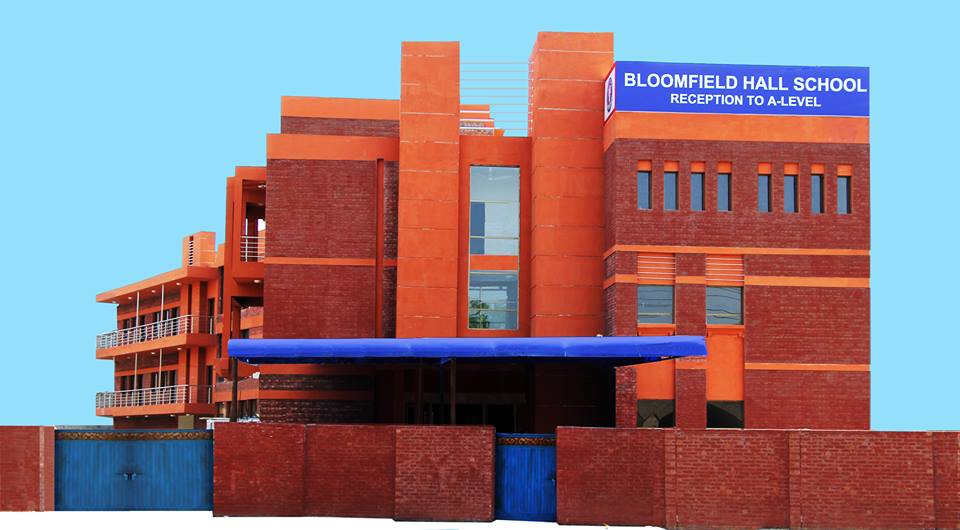
Facilities:
-
- Montessori Classrooms: Bloomfield Hall School provides dedicated Montessori classrooms that are designed to create a child-centered learning environment. These classrooms are equipped with Montessori materials and child-friendly furniture, promoting hands-on learning and independent exploration.
-
- Outdoor Play Areas: The school typically has outdoor play areas where Montessori children can engage in physical activities, play games, and develop their gross motor skills.
-
- Resource Centers: Bloomfield Hall School often has resource centers or libraries that offer a wide range of educational materials, books, and resources to support children’s learning and encourage further exploration.
Activities:
-
- Practical Life Skills: Bloomfield Hall School’s Montessori curriculum emphasizes practical life skills such as pouring, dressing, cleaning, and food preparation. These activities help children develop fine motor skills, independence, and self-help abilities.
-
- Sensorial Development: The school incorporates sensorial activities that engage children’s senses and assist in refining their ability to observe, discriminate, compare, and categorize based on various sensory attributes like size, shape, color, and texture.
-
- Language and Literacy: Bloomfield Hall School focuses on language development through activities that enhance vocabulary, phonetic awareness, listening, speaking, reading, and writing skills. Montessori materials like sandpaper letters and movable alphabets may be utilized.
-
- Mathematics: The Montessori programs introduce mathematical concepts using hands-on materials such as number rods, counting beads, and numeral cards. Children engage in activities that develop number recognition, counting, and basic arithmetic skills.
-
- Cultural Subjects: Bloomfield Hall School’s Montessori curriculum integrates cultural subjects such as geography, history, science, and art. These subjects provide children with a broader understanding of the world, promote curiosity, and encourage exploration and cultural appreciation.
Benefits:
-
- Child-Centered Approach: Bloomfield Hall School’s Montessori education follows a child-centered approach, recognizing and respecting the unique needs, interests, and learning styles of each child. This approach fosters a love for learning, intrinsic motivation, and a sense of responsibility.
-
- Holistic Development: The Montessori programs at Bloomfield Hall School aim to promote holistic development, encompassing cognitive, social, emotional, and physical growth. The activities and materials used in the Montessori classrooms cater to various aspects of a child’s development.
-
- Self-Directed Learning: Bloomfield Hall School’s Montessori education encourages self-directed learning and independent thinking. Children are given the freedom to choose their activities and work at their own pace, developing problem-solving skills, decision-making abilities, and a sense of autonomy.
-
- Prepared Environment: Bloomfield Hall School’s Montessori classrooms provide a prepared environment that is organized, visually appealing, and conducive to learning. This environment supports concentration, focus, and the development of essential life skills.
-
- Smooth Transition to Primary Education: Bloomfield Hall School’s Montessori programs facilitate a smooth transition for children into primary education. The strong foundation in key academic areas and the development of critical skills prepare children for further learning and academic success.
Head Start School
Location: Multiple cities across Pakistan
Website: https://hs.edu.pk/
The Head Start School System is an esteemed educational institution that offers a Montessori education approach. Here’s a detailed account of the school’s facilities, activities, and benefits:
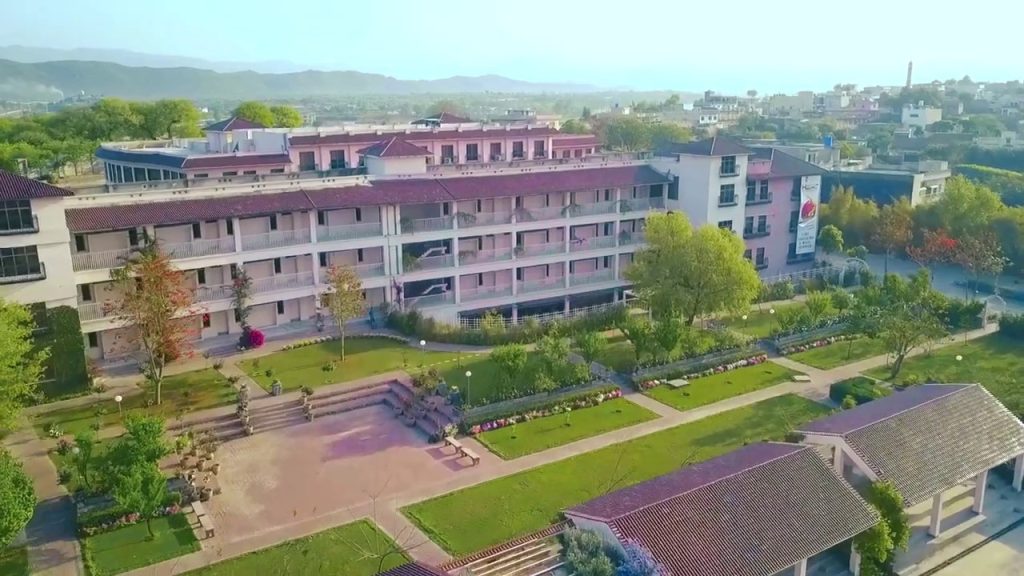
Montessori Education Approach:
The Head Start School System follows the Montessori education approach, which is based on the educational philosophy developed by Dr. Maria Montessori. This approach emphasizes self-directed learning, hands-on exploration, and individualized instruction. It aims to nurture the whole child’s development—intellectual, social, emotional, and physical.
Facilities:
The school provides a conducive learning environment with well-designed facilities that support the Montessori method. These facilities typically include:
-
- Montessori classrooms: Each classroom is carefully prepared and equipped with a wide range of Montessori materials and resources. These materials are designed to foster independent learning and exploration.
-
- Practical life area: This area consists of activities that develop the child’s motor skills, coordination, and independence in daily tasks such as pouring, dressing, and cleaning.
-
- Sensorial area: Here, children engage in activities that refine their senses and develop skills like size discrimination, color grading, and shape recognition.
-
- Language area: The language materials and activities encourage vocabulary development, reading, and writing skills.
-
- Mathematics area: Children learn mathematical concepts using manipulative materials, which aid in understanding numbers, quantities, operations, and problem-solving.
-
- Cultural area: This area introduces children to various subjects like geography, science, history, and art, fostering their curiosity and exploration.
-
- Outdoor play area: The school typically provides a safe and well-equipped outdoor space where children can engage in physical activities, develop gross motor skills, and enjoy nature.
Activities:
The Head Start School System offers a range of activities that complement the Montessori approach and promote holistic development. These activities may include:
-
- Practical life activities: Children learn practical skills like pouring, cutting, and tying shoelaces, which enhance their independence and concentration.
-
- Sensorial exploration: Children engage in activities that refine their senses through exploration of colors, textures, smells, tastes, and sounds.
-
- Language and literacy activities: Students are exposed to phonics, vocabulary building, reading, storytelling, and creative writing exercises.
-
- Mathematical activities: Children work with Montessori math materials to develop numerical understanding, problem-solving abilities, and mathematical thinking.
-
- Cultural experiences: Students explore various cultures, traditions, and aspects of the world through activities like geography lessons, music, art, and celebrations.
-
- Outdoor play and physical education: Children participate in outdoor games, sports, and exercises to enhance their physical fitness, coordination, and teamwork skills.
Benefits:
The Head Start School System’s Montessori education approach offers several benefits to students:
-
- Individualized learning: Montessori classrooms allow children to progress at their own pace, providing individualized attention and tailoring instruction to their specific needs and interests.
-
- Development of independence: Through practical life activities and self-directed learning, children develop a sense of responsibility, independence, and self-confidence.
-
- Love for learning: The Montessori method fosters a love for learning by encouraging children’s natural curiosity and providing them with engaging and meaningful learning experiences.
-
- Holistic development: The approach focuses on the overall development of the child, including intellectual, social, emotional, and physical aspects, promoting a well-rounded education.
-
- Critical thinking and problem-solving: Montessori education emphasizes critical thinking skills, problem-solving abilities, and encourages children to ask questions and explore their own solutions.
-
- Social and emotional development: Children learn to collaborate, communicate, and develop empathy through interactions with their peers, fostering social and emotional skills.
-
- Long-term success: Research suggests that Montessori-educated children often demonstrate strong academic and social skills, adaptability, and a lifelong love for learning.
Overall, the Head Start School System provides a nurturing environment, engaging activities, and the benefits of Montessori education, fostering the holistic development of children and preparing them for future academic and personal success.
It is important to note that this list is not exhaustive, and there are many other Montessori schools in Pakistan that may provide excellent educational experiences. When choosing a Montessori school, it is advisable to visit the schools, speak with the staff, and assess whether their approach aligns with your understanding of authentic Montessori education.
FAQs
- What age is best for Montessori schools?
Montessori schools are best suited for children between the ages of 2 and 6 years old. This age range aligns with the foundational years of development and exploration. The Montessori method emphasizes hands-on learning, independence, and collaborative work within a carefully prepared environment. While some Montessori schools may offer programs for older children, the primary focus is typically on early childhood education.
- What is the highest grade in Montessori schools?
While the Montessori method is primarily associated with early childhood education, some Montessori schools extend their programs to include elementary and even secondary education. The highest grade offered in Montessori schools can vary, but it is not uncommon to find Montessori programs that go up to the 6th grade or even higher. However, it’s important to note that the availability of Montessori education at higher grade levels can vary depending on the specific school and region. The emphasis on child-centered, experiential learning and fostering independence remains a core aspect of Montessori education, regardless of the grade level.
- Which montessori schools is on top in Pakistan?
There are several well-known Montessori schools in Pakistan that have gained recognition for their educational approach. Some of the reputed Montessori schools in Pakistan include Future World Schools, Beaconhouse School System, Lahore Grammar School (LGS), The City School, and Roots Millennium Schools.
Conclusion
Broadly speaking, Montessori education in Pakistan has gained recognition and popularity as an effective approach to early childhood education. Several schools in the country have embraced the Montessori method, providing children with an environment that fosters independence, hands-on learning, and respect for individuality.
Montessori schools in Pakistan follow the core principles of the Montessori philosophy, offering carefully prepared environments that cater to the developmental needs of children between the ages of 2.5 and 6 years. These environments are equipped with age-appropriate materials and activities that encourage practical life skills, sensorial development, language acquisition, mathematics, and cultural exploration.
The Montessori classrooms in Pakistan are designed to stimulate the child’s curiosity and promote independent learning. Teachers in these classrooms act as facilitators, observing and guiding children individually based on their unique interests and learning styles. Parents in Pakistan have shown a growing interest in Montessori education due to its child-centered approach and emphasis on holistic development.
However, it is crucial to note that not all schools labeled as “Montessori” in Pakistan may adhere to the authentic Montessori philosophy. Parents should research and visit schools to ensure they align with the core principles and practices established by Dr. Maria Montessori.
The list provided earlier includes some well-known Montessori schools in Pakistan, but it is important to conduct further research and visit schools personally to make an informed decision about the best Montessori school for your child.
Overall, Montessori education in Pakistan aims to provide a nurturing and stimulating environment where children can develop their cognitive, social, emotional, and physical skills. By embracing the Montessori method, these schools strive to lay a strong foundation for lifelong learning and a love for education in young children.

